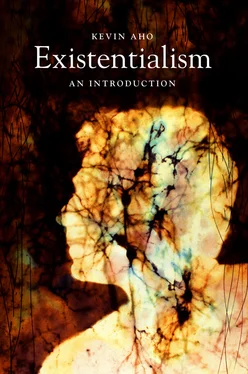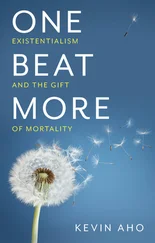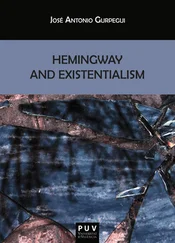Kevin Aho - Existentialism - An Introduction
Здесь есть возможность читать онлайн «Kevin Aho - Existentialism - An Introduction» весь текст электронной книги совершенно бесплатно (целиком полную версию без сокращений). В некоторых случаях можно слушать аудио, скачать через торрент в формате fb2 и присутствует краткое содержание. Год выпуска: 2013, ISBN: 2013, Издательство: Polity, Жанр: Философия, на английском языке. Описание произведения, (предисловие) а так же отзывы посетителей доступны на портале библиотеки ЛибКат.
- Название:Existentialism: An Introduction
- Автор:
- Издательство:Polity
- Жанр:
- Год:2013
- ISBN:978-0745651422
- Рейтинг книги:3 / 5. Голосов: 1
-
Избранное:Добавить в избранное
- Отзывы:
-
Ваша оценка:
- 60
- 1
- 2
- 3
- 4
- 5
Existentialism: An Introduction: краткое содержание, описание и аннотация
Предлагаем к чтению аннотацию, описание, краткое содержание или предисловие (зависит от того, что написал сам автор книги «Existentialism: An Introduction»). Если вы не нашли необходимую информацию о книге — напишите в комментариях, мы постараемся отыскать её.
Existentialism: An Introduction
Existentialism: An Introduction — читать онлайн бесплатно полную книгу (весь текст) целиком
Ниже представлен текст книги, разбитый по страницам. Система сохранения места последней прочитанной страницы, позволяет с удобством читать онлайн бесплатно книгу «Existentialism: An Introduction», без необходимости каждый раз заново искать на чём Вы остановились. Поставьте закладку, и сможете в любой момент перейти на страницу, на которой закончили чтение.
Интервал:
Закладка:
To decline to be the Other, to refuse to be a party to the deal — this would be for women to renounce all the advantages conferred upon them by her alliance with the superior caste. Man-the-sovereign will provide woman-the-liege with material protection and will undertake the moral justification for her existence; thus she can evade at once both economic risk and the metaphysical risk of a liberty in which ends and aims must be contrived without assistance. Indeed, along with the ethical urge of each individual to affirm her subjective existence, there is also the temptation to forgo liberty and become a thing. This is an inauspicious road, for she who takes it — passive, lost, ruined — becomes henceforth the creature of another's will, frustrated in her transcendence and deprived of every value. But it is an easy road; on it one avoids the strain involved in undertaking an authentic existence. When man makes of woman the Other , he may, then, expect her to manifest deep-seated tendencies toward complicity. (xxiv)
Beauvoir interprets this active complicity as especially prevalent among white upper-class women because they have the most to gain in preserving the masculine status quo both in terms of material comfort and, more importantly, in terms of being disburdened of the “terrible freedom” of self-creation. Mired in bad faith, “they are eager accomplices of their masters because they stand to profit from the benefits provided. … They repress all thought, all critical judgment, all genuineness is dead in their hearts and even in their faces” (697).
But the political oppression of privileged white woman is different from more extreme forms of oppression. As we saw earlier, existentialists generally regard the human situation as intersubjective or relational, that is, we can understand ourselves only through our public interactions with others. ‘The look,’ that is, the social judgment of others, is essential to the formation of our identities. Beauvoir takes this idea to show that the man — in order to understand himself as superior — needs to be seen and recognized by the woman as such. Following Hegel's notion of the ‘master — slave dialectic,’ Beauvoir argues that man's self-identification as ‘master’ is dependent on the ‘slave,’ in this case on the woman's recognition of him as a more powerful and noble being. Thus, if the woman is wholly reduced to a thing and stripped of her transcendence, she cannot freely give the man the recognition he needs to maintain his identity. Yet the politics of recognition do not extend to all aspects of alterity. If the woman is too old, for instance, mentally ill, poor, disabled, or black, she may be dehumanized to such an extent that she falls outside the sphere of inter-human relations. In these cases, her judgments are irrelevant to the master's self-interpretation. This brings up the problem of ‘total objectification,’ and it is here that we can begin to appreciate existentialism's impact on the development of critical race theory by providing a vocabulary and conceptual framework to articulate the black experience of oppression.
There are a number of black theorists and writers, including W. E. B. Du Bois (1868–1963), Alain Locke (1885–1954), Ralph Ellison (1914–1994), Richard Wright, and Frantz Fanon, whose works resonate to the core ideas of existentialism, especially those of Sartre and Beauvoir. In Ellison's novel Invisible Man (1952), for example, we are introduced to a black man whose existence is so diminished that he feels himself to be literally absent or invisible because white eyes do not see or recognize him as a human being . “I am an invisible man,” writes Ellison. “I am a man of substance, of flesh and bone, fiber and liquids — and I might even be said to possess a mind. I am invisible, understand, simply because people refuse to see me” (1995, 3). This total lack of recognition results in an experience of ‘total oppression,’ where every aspect of an individual's capacity for future self-creation is stripped away (Birt 1997). The individual is transformed into a brute thing, deprived of his or her ontological status as a human being. In Beauvoir's words, s/he is “reduced to pure facticity, congealed in his [or her] immanence, cut off from his [or her] future, deprived of his [or her] transcendence … no more than a thing among things” (1948, 100).
In Black Skin, White Masks , Fanon will refer to this phenomenon in terms of “overdetermination” (1967, 118), where the objectifying gaze of the white colonizer destroys the very struggle between facticity and transcendence that makes him human (Gordon 1997, 73). His identity becomes fixed or frozen; he is transformed into ‘a new genus,’ into something subhuman or bestial by the color of his skin:
I am given no chance. I am overdetermined from without. I am a slave … of my own appearance. … I progress by crawling. And already I am being dissected under white eyes, the only real eyes. I am fixed … I am laid bare. I feel, I see in those white faces that it is not a new man who has come in, but a new kind of man, a new genus. Why, it's a Negro! (Fanon 1967, 118)
Overdetermined in this way, the human ability to give meaning, to ‘take a stand’ on one's own facticity, becomes impossible. He is wholly contained and trapped in his blackness. And there is no way to transcend this predicament, to freely remake his identity. “ Wherever he goes ,” says Fanon, “ the Negro remains a Negro ” (173). Cornel West will later expand on Fanon's insight by articulating the extent to which the social forces of late modern capitalism fortify this dehumanizing situation, reinforcing the experience of hopelessness, paralyzing rage, and self-loathing that is so pervasive in poor black communities. The result is what he calls “a kind of walking nihilism ” (1993, 90).
For West, the ‘walking nihilism’ of the black underclass is, in large part, the byproduct of our global market economy, where everything and everyone is transformed into an object or commodity for profit. In this kind of situation, the possibilities for individual self-creation are already extremely constrained because one's identity and sense of self-worth is limited to acts of crass consumerism and material excess, glorified daily on television, in magazines, movies, and pop music. But the black underclass cannot participate in these self-defining acts, and this only exacerbates their feelings of despair and worthlessness. Yet in his attentiveness to the particularities of market-driven poverty, West shows how the contemporary experience of nihilism transcends race, class, and gender, affecting huge swaths of the post-industrial population and leaving whole generations of the unemployed and underemployed adrift and unsupported, trapped in their facticity (Gates and West 1997, 107–112).
Like many critical race theorists, West makes it clear that his philosophy is indelibly shaped by existentialism and its focus on the concrete and particular concerns of being human rather than the traditional focus on intellectual detachment and abstraction that characterizes so much of “academic” or “university” philosophy (1993, 33). But it can be pointed out that existentialism's attentiveness to lived experience is not only neglected in mainstream Anglophone philosophy departments; it is also largely absent in the ‘postmodern’ philosophies that share many of the same theoretical commitments as existentialism in, for instance, their critiques of foundationalism and the authority of reason, their rejection of universalism and essentialism, and their focus on issues of ‘Otherness,’ heterogeneity, and difference. As bell hooks argues, postmodern discussions of alterity and difference often perpetuate the very political hierarchies they are trying to ‘deconstruct.’ First of all, the discussions generally take place in contexts that invariably exclude ‘the Other,’ specifically the privileged white halls of the academy. In these rarefied contexts, it is usually only those from a particular race and class, trained in the jargon-infused language of contemporary French theory that can participate in the discussion. Those who are most oppressed and exploited are not present, and if they were, they could not possibly understand what is being said. More importantly, the intellectual focus of postmodernism is largely on ‘Otherness’ as a theoretical abstraction. It is not on the concrete other, the impoverished minority who washes the dishes in the back of the restaurant or cleans my hotel room after I give my talk on ‘Otherness’ at the philosophy conference. “It is sadly ironic,” writes hooks, “that the contemporary discourse [of postmodernism] which talks about heterogeneity, the decentered subject, declaring breakthroughs that allow recognition of Otherness, still directs its critical voice primarily to a specialized audience that shares a common language rooted in the very master narratives it claims to challenge” (1993, 512).
Читать дальшеИнтервал:
Закладка:
Похожие книги на «Existentialism: An Introduction»
Представляем Вашему вниманию похожие книги на «Existentialism: An Introduction» списком для выбора. Мы отобрали схожую по названию и смыслу литературу в надежде предоставить читателям больше вариантов отыскать новые, интересные, ещё непрочитанные произведения.
Обсуждение, отзывы о книге «Existentialism: An Introduction» и просто собственные мнения читателей. Оставьте ваши комментарии, напишите, что Вы думаете о произведении, его смысле или главных героях. Укажите что конкретно понравилось, а что нет, и почему Вы так считаете.












